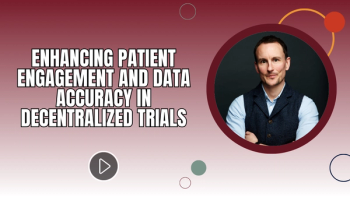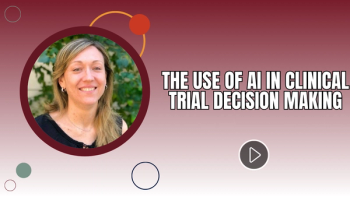
In this video interview, Ron Lanton, partner, Lanton Law, discusses how a potential increase in drug costs could affect the clinical research industry.

In this video interview, Ron Lanton, partner, Lanton Law, discusses how a potential increase in drug costs could affect the clinical research industry.

Full results from the Phase III ASCENT-04/KEYNOTE-D19 study demonstrated statistically significant and clinically meaningful survival benefits in patients with previously untreated, PD-L1-positive metastatic triple-negative breast cancer.

In the SmartfIRE study, the Thermocool Smarttouch SF catheter showed an 86.9% effectiveness rate among patients treated with high adherence to recommended ablation parameters.

Andrew Mackinnon, Executive GM, Medable, discusses how AI-driven innovations are streamlining clinical trials through enabling scalable operations.

Andrew Mackinnon, Executive GM, Medable, explains how the company’s recent approval in France could support the expansion of digital and decentralized clinical trials across Europe, particularly through enhanced e-consent practices.

Andrew Mackinnon, executive GM, Medable, explains how the company ensures high patient participation and data accuracy in decentralized trials.

Ron Lanton, Partner, Lanton Law, shares his insights on the legal and political consequences of the NIH funding freeze and potential options for continuing research.

Ron Lanton, Partner, Lanton Law, discusses the impact of diversity bans and political challenges on the clinical trials industry.

Ron Lanton, Partner, Lanton Law, discusses how stakeholders must navigate funding future clinical research amid NIH budget cuts.

In an interview with Applied Clinical Trials Associate Editor Don Tracy, Shakthi Kumar, chief strategy & business officer, Edetek, provides examples of how Agentic AI can accelerate clinical development.

In an interview with Applied Clinical Trials Associate Editor Don Tracy, Graham Clark, CEO, Phastar, discusses key objectives for attending SCOPE, the rise of real-world evidence, and partnerships critical to improving the success of clinical trial outcomes.

In an interview with Applied Clinical Trials Associate Editor Don Tracy, Sebastien Coppe, CEO, One2Treat, talks challenges faced by startups in advancing clinical trial innovation.

In an interview with Applied Clinical Trials Associate Editor Don Tracy, Samuel Salvaggio Senior Trial Design Lead, One2Treat, discusses partnerships that remain vital for guaranteeing success in clinical trial efficiency.

In an interview with Applied Clinical Trials Associate Editor Don Tracy, Samuel Salvaggio, Senior Trial Design Lead, One2Treat, discusses the company's main goals for attending the SCOPE Summit, including patient centric trial design.

In an interview with Applied Clinical Trials Associate Editor Don Tracy, Shakthi Kumar, chief strategy & business officer, Edetek, discusses how Edetek's R&D cloud system addresses challenges in clinical data management.

In an interview with Applied Clinical Trials Associate Editor Don Tracy, Richard Young, chief strategy officer, Cluepoints, offers his key takeaways from this year's SCOPE Summit in Orlando.

In an interview with Applied Clinical Trials Associate Editor Don Tracy, Peter Ronco, CEO, Emmes, provides advice to small biopharma companies looking to scale their clinical programs without overextending resources.

In an interview with Applied Clinical Trials Associate Editor Don Tracy, Richard Young, chief strategy officer, CluePoints, discusses goals of the SCOPE Summit and CluePoints' evolving approach to risk detection.

In an interview with Applied Clinical Trials Associate Editor Don Tracy Peter Ronco, CEO, Emmes, discusses the number of risks small biopharma companies taken when taking on clinical trial partners/

Conference breakout session explores strategies for trial sites to strengthen patient relationships.

In an interview with ACT Associate Editor Don Tracy, Peter Ronco, CEO, Emmes, discusses the "Choosing the Right Allies: Ensuring Clinical Trial Success for Small Biopharma" session.

Conference breakout session examines the role of strategic partnerships in driving progress for sexual and gender minority inclusion in clinical research.

Conference keynote explores the long-term vision for integrating clinical research and care by 2035, including progress driven by digital advancements, artificial intelligence, and evolving regulatory frameworks.

In the study, Calquence plus chemotherapy reduced the risk of disease progression or death by 27%.

While there has been a number of recent initiatives put into place to support diversity, equity, and inclusion in clinical trials, there is still a considerable amount of room for improvement.

With the increasing use of artificial intelligence and machine learning in medicine development, what role will they play in the clinical trial space moving forward?

In an interview with Applied Clinical Trials Associate Editor Don Tracy, Sonia Lwoff, director, clinical operations, Rho, discusses the potential for artificial intelligence in clinical trial decision-making and enrollment.

In an interview with Applied Clinical Trials Associate Editor Don Tracy, director, clinical operations, Rho, offers her thoughts on key considerations that sponsors should be mindful of during the decision-making process with the timeline of a clinical trial.

Results of a Phase II study of ponsegromab showed significant improvements in body weight, muscle function, and overall symptoms for patients with cancer cachexia, offering hope for a new targeted treatment.

In an interview with Applied Clinical Trials Associate Editor Don Tracy, Sonia Lwoff, director, clinical operations, Rho, discusses the importance of CROs building strong relationships with trial sites.